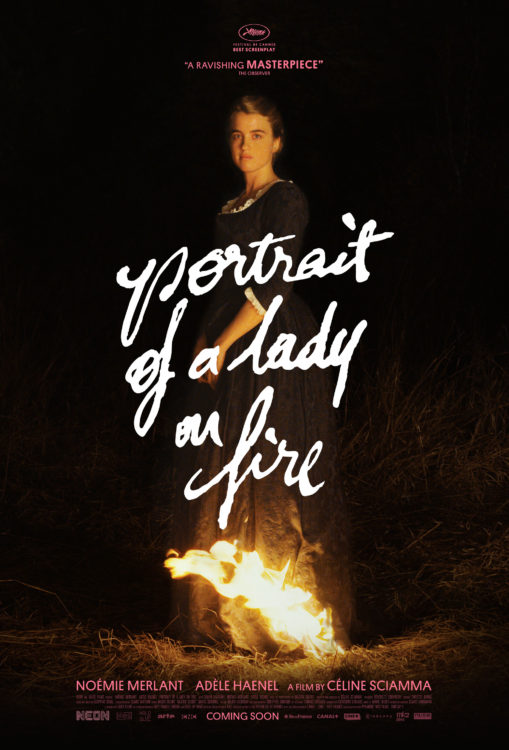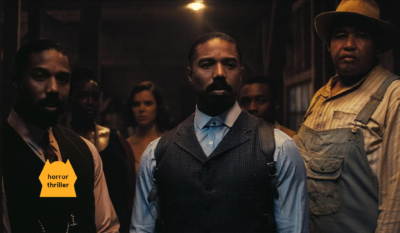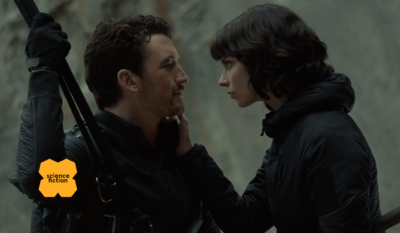Portrait of a Lady on Fire is a quiet period drama that follows an artist as she attempts to paint her enigmatic subject in secret
Quick review: Quiet yet filled with intensity, Portrait of a Lady on Fire nails the physicality and emotions associated with mutual unspoken attraction — the glances, the awkwardness, the frustrations. It's a slow burn — pun intended — as it builds the relationship between the protagonists, but the pay off is absolutely worth the wait.
There's nothing like a film from an auteur that speaks to their own experiences. And while director Céline Sciamma‘s Portrait of a Lady on Fire is set in the late 18th century, it feels so modern in its approach and themes as she explores what's familiar to her as a queer woman. She's not tapping into specific experiences, but a feeling.
A young painter Marianne (Noémie Merlant) is taken aback when one of her students discovers one of her paintings called “Portrait of a Lady on Fire.” We focus on the painting. It's dark with almost no detail distinguishable except for a woman turned away from us with her dress on fire at the hem. Then we smash cut to Marianne on a rickety boat crossing a crystal blue sea to a manor on an isolated island where she was summoned by a countess (Valeria Golino) to paint a portrait of her daughter, Héloïse (Adèle Haenel).

What the Countess didn't reveal before her arrival is that Héloïse doesn't know that Marianne is here to paint her portrait. Instead, she believes that she's a companion hired to keep her company — and keep watch of her. You see, Héloïse is betrothed to her late sister's ex-fiance. As the manor's young maid Sophie explains, Héloïse's sister is believed to have committed suicide by throwing herself off a cliff. Now, Héloïse refuses to pose for her wedding portrait as a sort of protest to the marriage.
What's so interesting about Portrait of a Lady on Fire is that usually at this point of the plot synopsis I'd say, “and you know where the story goes from there.” And while it generally sticks to what you'd expect, the way it gets there is unlike any other auteur and pure Sciamma.


Chloé Zhao makes Nomadland‘s melancholic but hopeful story of nomads traversing the American West a stunningly complex character study of life on the margins of society.
![]()

💌 Sign up for our weekly email newsletter with movie recommendations available to stream.
ADVERTISEMENT
The movie isn't a grand romance of two women born in the wrong time and place finding each other. Instead, it's about two women discovering and understanding each other. With that deep understanding comes desire. And the way Sciamma portrays that desire is with so much smoldering intimacy that it's almost impossible to resist.
Instead of relying on words like Call Me by Your Name, Sciamma's film is minimal in dialogue but ripe with physicality. The way that Marianne and Héloïse look at each other is as important as when they don't look at each other. In particular, the way Marianne observes Héloïse for her painting is interesting because you can watch the gaze shift from one of artist looking at her subject to something more. It's remarkable just how much she can communicate.
There's no better example of this than the stunning final shot that lingers for longer than is comfortable and packs so much impact that it leaves you stunned when the movie cuts to black. As unassuming as it is, Portrait of a Lady on Fire is filled with those breathtaking moments that just remind you of the power of a clear vision.
ADVERTISEMENT
More movies, less problems
- ‘Sinners' is the best movie of the year | movie review
- Romantic sci-fi thriller ‘The Gorge' hits its mark | movie reivew
- A Love Note to Fire of Love
Hey! I'm Karl. You can find me on Twitter and Letterboxd. I'm also a Tomatometer-approved critic.
💌 Sign up for our weekly email newsletter with movie recommendations available to stream.
ADVERTISEMENT
💌 Sign up for our weekly email newsletter with movie recommendations available to stream.
ADVERTISEMENT
Hey, I'm Karl, founder and film critic at Smash Cut. I started Smash Cut in 2014 to share my love of movies and give a perspective I haven't yet seen represented. I'm also an editor at The New York Times, a Rotten Tomatoes-approved critic, and a member of the Online Film Critics Society.



